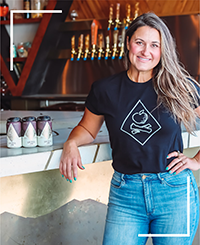
Tips from the Bar: Lara Worm

NLD Chair
After 10 years as a federal prosecutor, Lara Worm pivoted from law and co-founded Bivouac Ciderworks, a hard cider taproom and restaurant in North Park.
Worm, who wanted to be a criminal prosecutor since age 5, grew up in San Diego in a family of small business owners. Her grandfather owned Old Roadside BBQ, and her father and uncle grew up in the restaurant. Her father eventually opened his own spot, Bekker’s BBQ. It was there where her father met her mother, who ran her own business next door.
Like many children who grow up in the family business, Worm began working at an early age. She had a two-page resume going into high school, including washing dishes at age 10 (BBQ unsurprisingly produces very messy dishes) and serving tables.
Worm’s father would often tell her, “If you ever want to be the boss, you need to know what the dishwasher does.” Worm has relied on that advice throughout her legal and business career. She recommends attorneys do the same — understand all the different parts to their practice, including the roles of legal assistants, paralegals, and opposing counsel. “That way you have compassion and understanding for your colleagues, clients, and adversaries, and you can prepare for any situation.”

Going “Off-Trail”
Worm was determined to become an attorney instead of pursuing a career in the food and beverage industry. She attended California State University Long Beach for undergrad, majoring in communications and women’s studies, and George Washington University Law School in Washington, D.C.
Worm clerked for a judge in the Superior Court of the District of Columbia upon graduation. It was a step toward her dream job: working at the U.S. Attorney’s Office in D.C. and prosecuting crimes in the superior court. Unique to D.C., Assistant U.S. Attorneys (AUSAs) may prosecute crimes that are traditionally prosecuted by local or state prosecutors.
Following her dream, Worm started prosecuting misdemeanors, then drug offenses and violent crimes. After her third year, she transferred to the homicide section, where she worked with cops, homicide detectives, and FBI agents. Reporters from The Washington Post would regularly report on her cases.
Worm recommends law students enroll in courses that are taught by practicing attorneys in their desired area. The judge she clerked for taught her trial advocacy class, and her supervisor in the homicide section taught a course on homicide cases.
After Worm worked on the case of a lifetime involving a missing 8-year-old girl, which included a multijurisdictional investigation, she thought it was an appropriate time to move back to San Diego.
The hardest part of moving from D.C. to San Diego was leaving her network and the community she had cultivated during a decade of legal education and practice. But persuaded by weather, lifestyle, and her family in San Diego, in 2014, Worm moved to San Diego and joined the San Diego U.S. Attorney’s Office. She started in the border enforcement section and then moved to narcotics, organized crime, and wiretaps. She spent four years at that office.
From Wiretaps to Cider Taps
One day in 2017, Worm’s friend asked her to start a business together — a cidery. Her initial response: No. She never entertained the thought of leaving her role as a federal prosecutor. However, after more assessment, Worm decided to embrace the adventure and obtained approval from her office to work on the business after hours. Her entrepreneurial spirit — developed through her childhood at the family business — was underserved in her government role.
Bivouac — meaning temporary camp — was born. The San Diego-based brand embraces the lives of adventurers like Worm, who is an avid outdoors person. They started by making craft ciders on the weekend. Worm became more involved, including securing a location in North Park, raising money, brand building, and marketing. Bivouac was successful from the start. It won best new cidery of the year, best new restaurant, and was written about in Eater, Sunset Magazine, and The New York Times. The cidery was also picked up by a distributor early on, which is rare.
This all happened while Worm was still an AUSA. Eventually, she was unable to keep both jobs. Worm, who describes herself as “risk tolerant,” assessed the risks and weighed the pros and cons. After 10 years as a trial attorney, including over 60 trials and work on high-stakes federal investigations and wiretaps, Worm thought it was an appropriate time to pivot from practicing law.
Always a Lawyer at Heart
Being an attorney is often deeply ingrained with someone’s identity. Worm “loved being a lawyer” and struggled with the identify shift — from trial attorney to managing a cidery, bar, and restaurant. However, Worm does not regret her career change and has even harnessed her grit from being a lawyer into running a successful business.
The COVID pandemic had a substantial impact on the business, but Worm has thrived in crises: “Trial attorneys are trained for battle. They cannot give up but must rise to the occasion.” Worm often dealt with unexpected mishaps or disasters during trials that required fortitude and quick pivots. Worm relied on those experiences to keep Bivouac afloat and support its employees during the shutdowns. As Worm says, “There are always challenges in business. You need to adapt.”
Another example is when wildfires in Oregon destroyed Bivouac’s source of blackberries, used in its most popular and best-selling cider, San Diego Jam. The cost went from around $50 per gallon to $270 per gallon almost overnight. One option was to buy the blackberries anyway and take a large loss in order to keep the customers’ favorite cider on the shelves and at top locations like the San Diego Zoo and Hotel Del Coronado.
Worm ultimately took a risk by changing the cider into mixed berry, including blueberries and black currants. They marketed the new version, noting the higher level of antioxidants. Sales have increased. “To succeed in business, you need to work hard, develop a good product, and have an openness to pivoting.”
Unsurprisingly, Worm’s background has helped Bivouac avoid some legal bills. When she needed a license from the California Department of Alcoholic Beverage Control, Worm submitted the application on her own and saved thousands of dollars. Worm also finds herself learning other areas of law, including employment and trademark.
Worm recalls what her grandfather told her several times: “It’s not an opportunity unless you’re ready for it.” Worm views her past experiences as building blocks: “Every moment prepared me for the next.” When the Bivouac opportunity arose, she was ready for it.
Attorneys may wish to leave the profession for a variety of reasons, including the impact the profession has on their mental health. Some have told Worm they wanted to leave the law for other opportunities but decided to remain due to the risks of changing careers. From her perspective, attorneys tend to be more risk averse about career changes, which is often limiting.
Worm recommends attorneys consider all their prior experiences and stay open minded — you never know what venture might be presented to you. “Lawyers have sharpened judgment and the best training to handle everything,” she said. Worm recommends that you embrace your adventure!